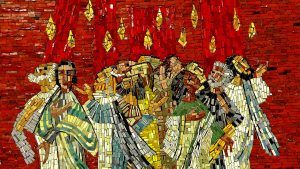Josh Kestner, Clemson, SC
Warm Up Questions
- How often do you interact with someone who is different from you? For example, how often do you interact with someone from a different neighborhood? Someone from a different school? Someone with a different racial identity or whose primary language is one other than English?
- Have you ever entered into a new community? Maybe you moved to a new town or started going to a new school or joined a new sports team. How did you feel? What kinds of things made you feel comfortable and welcome? What kinds of things made you feel uneasy and disoriented?
Borders and Walls
Ask anyone what they think about the US-Mexico border and odds are they’ll have an opinion to share. The border is a hot topic and it’s difficult to ignore the conversations that politicians, family members, and strangers are having about it.
There are countless beliefs about what should and should not be legal regarding immigration. And there are differing viewpoints about how to handle the crowds of people who want to become citizens – what the process should be, what to do with them while they wait, how to handle families that are split, etc.
There are no easy answers when it comes to immigration and border policies. The U.S. cannot effectively or sustainably let everyone in, but they also cannot in good faith keep everyone out. The problem with social issues like this one is that humanity often gets lost in the midst of the numbers and logistics.
Our ministry took a recent trip to the border and spent time with a local organization that facilitates programs to support the people who live there. We met folks who call the border towns home and others who are just passing through, hoping to transition from one home to another. The key was that we met actual human beings who are living with the real consequences of current immigration practices and policies.
We were blessed to walk with these strangers who graciously welcomed us into their lives. And for a few days we listened to stories. These were stories not about what should or should not happen, but instead about what is happening in their lives. These stories also included hopes of how the world should respond to properly care for the people who are caught up in the realities of immigration.
Conversations like this usually spiral into hypothetical guesses as to who or what Jesus might have voted for. A more faithful response, though, could be to open ourselves up to curiosity and care. We are called to listen deeply to the stories of the people around us and to build meaningful relationships. Then, we might finally be able to develop policies for things like immigration that are less harmful and more life-giving to the community as a whole.
Discussion Questions
- What is the general purpose of building a wall (e.g. a wall in the middle of a home)? When are walls useful? When might they have a negative effect? What are the effects that a wall might have at the US-Mexico border?
- Have you ever met someone from a different country? How did you interact with each other? How did you communicate? What did you do to try to get to know them?
- Have you ever been to a foreign country? How did you feel when you were there? Did you have to speak a different language? Did you try any new foods? Did you get lost?
Festival of Pentecost
(Text links are to Oremus Bible Browser. Oremus Bible Browser is not affiliated with or supported by the Evangelical Lutheran Church in America. You can find the calendar of readings for Year A at Lectionary Readings.)
For lectionary humor and insight, check the weekly comic Agnus Day.
Gospel Reflection
The gospel passage for this week is about the presence of the Holy Spirit in the lives of Jesus’ friends and followers. After Jesus rose from the dead and spent some time with his people in person, he left to be with God. While he was no longer going to be in their midst, he promised that the Spirit would come to provide the same kind of comfort, love, and guidance in their lives that he had given them for so long.
One of the other stories we read this week is from the book of Acts. It is a portrayal of the Holy Spirit showing up in the community on Pentecost. On that day, the Spirit rushed into the room like a mighty wind and appeared like a flame on the heads of the people who were there. Next, they all started to speak. Even though they were speaking different languages, each of them could understand the other.
There are so many things that we could take from the  passages this week. One of the things that sticks out is how indiscriminate the Holy Spirit is. The Spirit did not only come to a few of the people in the crowd, but it came to all of them. It didn’t matter whether or not the people were from one region or another. It didn’t matter what language they spoke. It didn’t matter how they dressed or how intelligent they were. It didn’t matter what they looked like. The Holy Spirit showed up and put on a show for them.
passages this week. One of the things that sticks out is how indiscriminate the Holy Spirit is. The Spirit did not only come to a few of the people in the crowd, but it came to all of them. It didn’t matter whether or not the people were from one region or another. It didn’t matter what language they spoke. It didn’t matter how they dressed or how intelligent they were. It didn’t matter what they looked like. The Holy Spirit showed up and put on a show for them.
This is a message that we can take with us. The very first thing that the Holy Spirit did in the community was tie them together. It did not separate them into groups of bad and good, then better and best. It pulled them together into a group of equals. Everyone had a role. Everyone had a purpose. Everyone had a place.
How empowering is that? Can we let ourselves believe that we, too, have the same kind of role, purpose, and place in the world? Can we feel the different ways that the Spirit is pulling us together instead of tearing us apart?
On this Pentecost, I hope that we can all take a deep breath and allow the Spirit of God to be a part of our lives. Perhaps it’s not as dramatic and spectacular as that day when tongues of fire appeared on the heads of the believers. But we, too, can find ways that the Spirit moves in our lives and guides us to do big things in the world around us.
Discussion Questions
- The Holy Spirit is often portrayed as a gust of wind or a breath of air. What does that feel like to you? How does that image help you to understand the Spirit’s presence in your life?
- Who are the people in your life that you trust the most? What makes you comfortable with them? What are the ways that you like others to show you love? How do you show love to others?
- Are there times in your life that you have found it difficult to know what you should be doing? Are there times when you’ve had a hard time knowing what was right and wrong? How do you make decisions? Do you ever pray or try to notice how the Holy Spirit is moving in your life?
Activity Suggestion
- Do you know any other languages? Look up how to say, “You are loved,” in different languages. Write them on note cards or sticky notes or something portable to the best of your ability (especially if the alphabet is not something that you’re familiar with). Carry these with you and spread them around your church building or outside in the nearby neighborhood. Perhaps someone will come across these words and be curious enough to look up what they say.
- The point of the story today is that God’s people are not uniform. We come from different backgrounds, we subscribe to different cultures, and we speak different languages. This activity can be a good reminder to us that children of God are beautiful and diverse. It can also be a simple way to stretch outside of our familiar lives and routines and take a step towards our neighbors in a meaningful way.
Closing Prayer
God, surround us with your love and fill us with the courage and confidence to share that love with one another. Open our hands and our hearts to truly attend to the needs of our neighbors. And empower us by your Spirit to broaden the boundaries of our communities to include all of your children. Amen.




